Kerry Washington and I were both blindfolded if not gagged when we spoke about Django Unchained. Metaphorically, you'll understand. Neither of us had yet seen Quentin Tarantino's latest revisionist revenge flick when we found a window in her schedule to talk but talk we did.
 Kerry Washington as "Broomhilda" in Django Unchained
Kerry Washington as "Broomhilda" in Django Unchained
Amusingly we had quite different feelings about not having yet seen it. I was desperate to attend a screening. Kerry was, apparently, not. When I asked her if she enjoyed watching her films she laughed with a "No!" and a shudder...
It's a process I force myself to endure. Usually not more than once.
For the rest of us the prospect of seeing one of the screen's most stunning actresses is a lot more enticing than 'something to endure'. Since Kerry's big screen roles have rarely been as sizeable as her talent, a key role from an A list auteur is something to treasure while we have it.
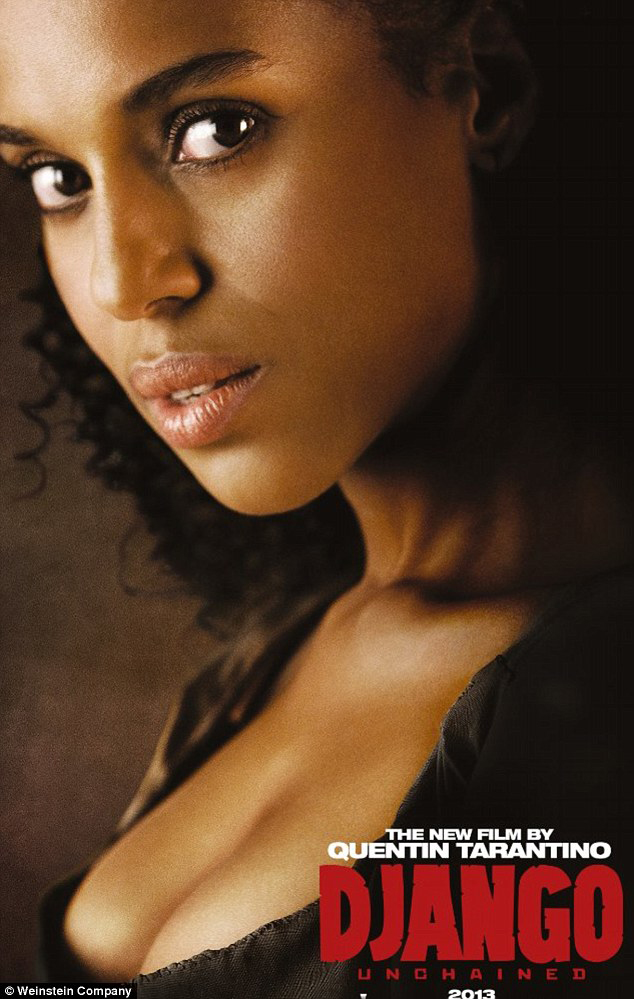 In Django Unchained, Kerry found herself in the unusual position of playing a relatively non-verbal part considering the dialogue heavy nature of Tarantino pictures. She plays Broomhilda von Shaft, the wife of freed slave Django (Jamie Foxx) who aims to rescue her from the sadistic plantation of Calvin Candie (Leonardo DiCaprio) where she currently resides.
In Django Unchained, Kerry found herself in the unusual position of playing a relatively non-verbal part considering the dialogue heavy nature of Tarantino pictures. She plays Broomhilda von Shaft, the wife of freed slave Django (Jamie Foxx) who aims to rescue her from the sadistic plantation of Calvin Candie (Leonardo DiCaprio) where she currently resides.
Our conversation about Django, her TV work, and the politics of her screen career is after the jump.
NATHANIEL R: When the screenplay first leaked I kept hearing that your part was very small but as the movie got closer to release, I kept seeing more photos of you in different costumes from the film. Do you feel you had a lot to work with in the film?
KERRY WASHINGTON: You know it's funny it never felt like a really small part to me. It's surprising that that was out there. The role is an important catalyst for what the film is. I do think the role evolved a lot. The whole film is a hero's journey to rescue his wife. When you are the goal at the finish line...
You're the damsel in distress if you will.
Yeah, yeah.
But obviously Tarantino writes more interesting characters than that.
It's hard to talk about something I haven't seen edited and finished -- you never know -- but to me even the idea of an African American woman in slavery being a 'Damsel in Distress' in itself was a complex idea. By making it illegal for black people to marry each other... for making it illegal for black women to keep their children unless the slave master wanted it that way ...the breakup of the humanity and the dignity and the loving familial relationships was such a vital tool for how slavery existed. So to have this black woman be a Damsel in Distress who is rescued by her husband was in itself a complex idea because it goes against everything the institution was good for.
You haven't shied away from the topic of race in your work like Night Catches Us. You and Mackie were beautiful together in that.
Oh thank you. He's so great.
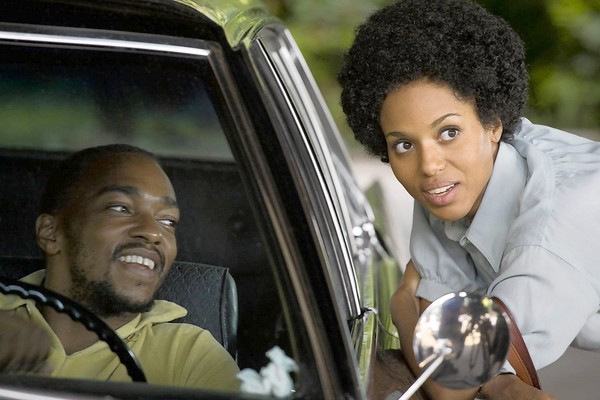 Anthony Mackie and Kerry Washington in "Night Catches Us"
Anthony Mackie and Kerry Washington in "Night Catches Us"
I know you're political active offscreen. So do you seek out parts like this?
No! It's so funny. I'm always having these conversations with women, actually. For so long our stories as a society have mostly been about one kind of protagonist: one gender, one race, one age bracket. By being more inclusive about how we define our lead characters, that in itself is a political act.
I don't gravitate to political work. I had just as much artistic gratification making Little Man as Last King of Scotland. But just the act of being a woman of being a person of color who brings full three dimensional humanity to their characters, those things can be interpreted as political because it's a new way of telling stories in this country -- in the world!
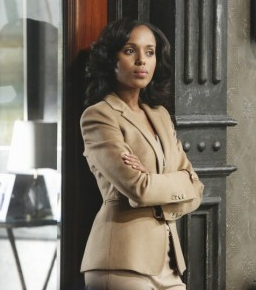 I was reading on your website something about you being the first African American woman to headline a TV show with Scandal. I thought that can't possibly be true. It's 2012!
I was reading on your website something about you being the first African American woman to headline a TV show with Scandal. I thought that can't possibly be true. It's 2012!
On a network show -- it's happened on cable. I'm the first in over 37 or 38 years. So not in my lifetime. It's so weird. It's not like I wanted to play Olivia Pope because the show was going to traffic in themes of racial identity. But the act of being a successful powerful African American woman in prime time can be interpreted as political.
You've done stage work, television, film. I'm wondering about the differences for you. I thought you were amazing in Dead Girl but you had so little time to build the character. On "Scandal" you can return to the character all the time.
That diversity in the experience is what I really love about what I do, I guess from the very beginning of my career. My very first film was Our Song which was total guerilla filmmaking. We had no trailers. There was no transportation department. There were just metrocards for the New York City subway. My mom would sometimes drop the lead actors home. My mom was helping everybody. That was my very first film and after that I did Save the Last Dance which was a totally different experience: Big budget, dance numbers, lighting setups that took two hours, choreographers and rewrites -- just a different process. I want to change it up so I like going from television to film to stage.
I actually saw Our Song in the theaters when I first started writing about movies. And I gave you an award that year for Breakthrough Performer. I was just looking at it today and I had written "Total natural. Cross your fingers that hollywood doesn't spoil it."
Awwww!
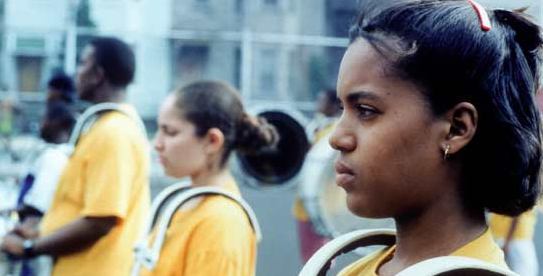 Kerry Washington's first role was in "Our Song" as a high school band member. She was marvelous in it.
Kerry Washington's first role was in "Our Song" as a high school band member. She was marvelous in it.
NATHANIEL R: I wrote that because unfortunately there are many talented people that don't get opportunities even after a breakthrough moment. Are you happy with where your career is now?
KERRY WASHINGTON: I.... [Pause] I guess the short answer is yes but I don't know... happy? To me it's not about getting anywhere. I want to be able to work and do what I love. Right now I'm so so lucky to be able to do what I love to do and on a regular basis and work with the caliber of people that I'm working with and doing the kinds of material I'm doing and still have the diversity in experience. The idea that I've gotten to go from playing a woman in the pre Civil War South in the context of slavery with Tarantino as a director and this kind of cast and to shoot that in the hiatus between season 1 and season 2 of a prime time drama working with one of my favorite show runners on the planet and a ridiculously talented cast and material that keeps me on my toes. I guess the answer is I feel like I'm being challenged and so that makes me happy.
Quentin Tarantino has said that his screenplays are very difficult and it's the actors who have to make his lines sing -- the writing is so specific and stylized.
I actually think this is such a different female character for him. Her power is really in her silences and in her inability to have a real -- she doesn't talk a whole lot. I got to learn German for the film which was amazing.
But, again, the juxtaposition of doing a show that's so language heavy. I don't think I'd be surviving "Scandal" right now if I hadn't spent a year working with David Mamet on Broadway. That prepared me for what I have to do every week. It was a different challenge with Tarantino. How do you make it not about that? What is the language of your body? What is the language of your eyes? How is the story being told outside of the words? And then it was hard to go back to "Scandal" because I felt like I couldn't move my mouth fast enough anymore [Laughter] I was like 'Aaaaaaahhhhh'. I had to do lip calisthenics before I go back.
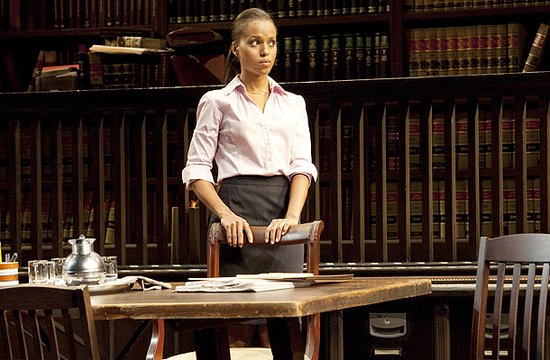 Kerry in David Mamet's "Race" on Broadway
Kerry in David Mamet's "Race" on Broadway
For Colored Girls had a little of both in a way -- the split between the naturalistic and poetic.
The first two weeks on For Colored Girls happened to overlap with my last two weeks on Race [The Broadway Show]. I felt like I was much more courageous with the poetry because I was coming off of doing Mamet.
Let's talk Oscars. Have you ever been to the show?
I haven't, no.
Have you thought about Django Unchained at all in terms of that. The buzz and whatnot.
No, I try to not think about it too much. I'm not really sure, you know, what would be useful about that. [Pause...] I mean I like to talk about it for other people. When Jamie called me when he accepted the role, I laughed and I said 'We should do this! We should get together once every decade and do a really important period piece with a really important director and hopefully win you an Oscar!' [Laughter].
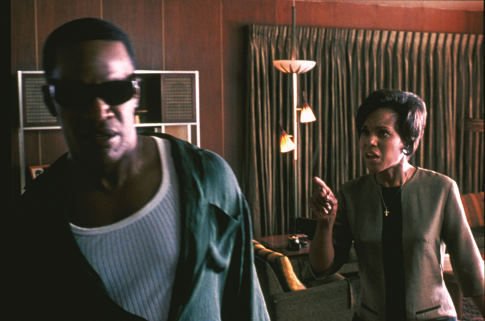
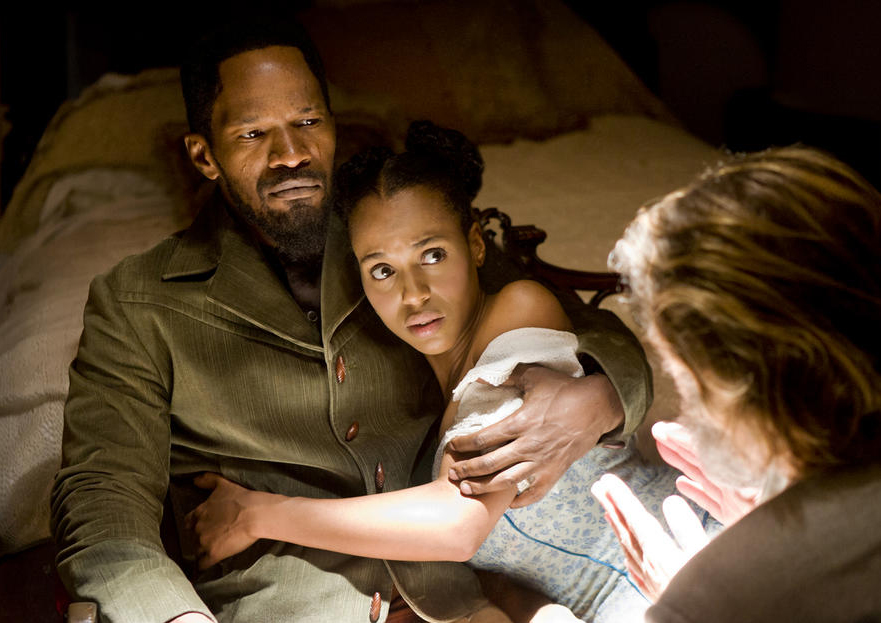 Jamie Foxx & Kerry Washington as spouses in RAY and DJANGO
Jamie Foxx & Kerry Washington as spouses in RAY and DJANGO
NATHANIEL R: That's awesome. It is a reunion only no singing this time!
KERRY WASHINGTON: He and I talked about that a little bit. There's a beautiful subconscious poetry to the idea, I think. The film is so much about a husband and wife being reunited after being separated. And that even for audiences it's a reunion between Jamie and I as husband and wife after being separated for several years. Someone who has seen the film said to me 'We believe that you have this shared history.' And in a lot of ways I think it's because we do. We know each other. We've been in the award season trenches. We've played husband and wife before. It's not easy but it feels appropriate and poetic to be doing it again.
How was it working with Leonardo DiCaprio?
Great. I think people are going to be so floored by his performance. He is absolutely a character actor stuck in a movie star's body. With this film you really get a chance to see him play a dark character. He'is not having to do that movie star thing. He can just take a risk and be the villain and he's just a horrible villain.
You know we had a hard time and he was very supportive. I couldn't have done this movie without these guys. We really held each other up in the process. The film was really really hard on all of us. I kept joking with Tarantino that I was going to send him all my extra therapy bills.
[Laughter]
We knew it was going to be a challenge but nobody knew how hard it was going to be on us. We had nights where Jamie and I, that neither of us could sleep. We would be texting each other at 3 o' clock in the morning. It was so difficult to process. I think what I gained most from doing the film was a phenomenal gratitude for my ancestors who were able to live through these conditions. Jamie and I barely lived through it for nine months in pretend. I don't think I could have done a week more without it really crushing me. The fact that anybody could live through that for real without having "cut. everybody go home. see you again tomorrow". I don't know. I don't know.
Leo... we talked alot about how in order for Jamie's rise out of the ashes to mean anything, for him to really be a hero, we have to be willing to embody the depths of hell that he's going into to rescue Broomhilda. We have to be able to portray the real evil of what slavery was so that his rise out of slavery actually means something to audiences. We knew it was worth it but it was hard.
I know you have to go but what do we have to do look forward to with you?
A full season of "Scandal" and We the Peoples will be out this spring. That's a romantic comedy with Craig Robinson.
Diahann Carroll is co-starring with you right?
She plays my grandmother, yeah. It's really really fun. It's the most fun I've ever had on a film set.
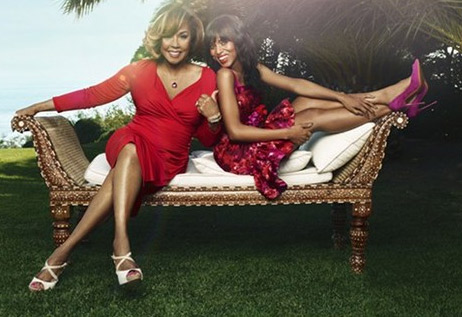 Kerry & Diahann in We the Peeples
Kerry & Diahann in We the Peeples